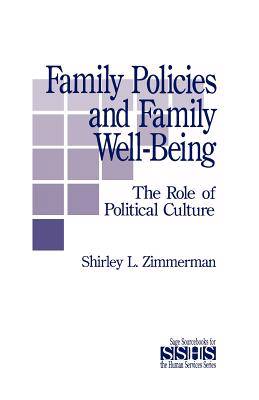
- Retrait gratuit dans votre magasin Club
- 7.000.000 titres dans notre catalogue
- Payer en toute sécurité
- Toujours un magasin près de chez vous
- Retrait gratuit dans votre magasin Club
- 7.000.0000 titres dans notre catalogue
- Payer en toute sécurité
- Toujours un magasin près de chez vous
216,95 €
+ 433 points
Description
How can you assess the effects of existing government policies on families? Are there ways to predict the effects of future policies upon the family? Challenging the view that governmental social programs have been detrimental to family life, Zimmerman provides empirical evidence to show that attitudes toward the governments′ role in relation to families are associated with the political cultures of different states. She also illustrates the relationship between states′ political cultures and the kinds of family policies states enact. Important guidelines are suggested to aid in the development of a policy agenda that will enhance the well-being of individuals and families, regardless of where they live. Family Policies and Family Well-Being examines findings from several independent but related undertakings including: a survey of family professionals living in states with different political cultures; an analysis of family legislation enacted by three states with different political cultures; and an examination of the relationships between states′ policy approaches to families and individual and family well-being and the role of political culture. Exercises are provided to encourage the reader to carefully scrutinize the main issues. Exploring the connections between family policies, individual and family well being, and political culture, this volume is important reading for professionals and students in social work, political science, public policy, family studies, and public administration. "Timely, thought-provoking, well-organized, and clearly written in an engaging and upbeat style. . . . The strength of the book lies in its versatility. It can be used in both undergraduate and graduate courses in politics, policy, and research methods. It can also serve as a model, or certainly as point of reference, for both novice and experienced researchers. Each chapter ends with a series of questions and exercises, and the appendixes include a glossary of terms (always a good idea), a chart of all 50 states categorized according to their respective political cultures, and a ready-made survey for anyone wishing to replicate Zimmerman′s study." --Family Relations "This . . . important book follows earlier work by the author . . . who is increasingly recognized as an expert in family policy. . . . [It] is highly recommended for professionals and scholars in the family field, and for upperclass and graduate students. Among its assets are the exercises at the end of each chapter which encourage careful scrutiny of the issues raised." --Journal of Marriage and the Family "Zimmerman is highly qualified to assess the subject of family policies and family well-being. Her ambitious study defines family policies as everything governments do that affect families. Zimmerman examines explicit and implicit policies, intentional and unintentional consequences, direct and indirect effects, and manifest and latent family effects. . . . Zimmerman explores the relationship between political culture and marital ties, teenage births, poverty, suicide rates, and welfare expenditures at a state level. The writing style is easy to read. There is a list of references and a glossary of terms used in the text. Advanced undergraduates." --Choice "The strength of this book lies in its versatility. It can be used in both undergraduate and undergraduate courses in politics, policy, and research methods. It can also serve as a model, or certainly as point of reference, for both novice and experienced researchers. Each chapter ends with a series of questions and exercises, and the appendices include a glossary of terms (always a good idea), a chart of all 50 states categorized according to their respective political cultures, and a ready-made survey for anyone wishing to replicate Zimmerman′s study." --Family Relations "The book will be most useful for readers interested in the connection between government and its family policies and programs. . . . Zimmerman makes the book appealing by including a glossary of terms and numerous tables, using current examples, providing relevant exercises, writing the book in first person, and explaining how the book can be used to understand the political culture of one′s own community." --Canadian Home Economics Journal
Spécifications
Parties prenantes
- Auteur(s) :
- Editeur:
Contenu
- Nombre de pages :
- 201
- Langue:
- Anglais
- Collection :
- Tome:
- n° 21
Caractéristiques
- EAN:
- 9780803942875
- Date de parution :
- 01-07-92
- Format:
- Livre broché
- Format numérique:
- Trade paperback (VS)
- Dimensions :
- 143 mm x 216 mm
- Poids :
- 299 g

Les avis
Nous publions uniquement les avis qui respectent les conditions requises. Consultez nos conditions pour les avis.






